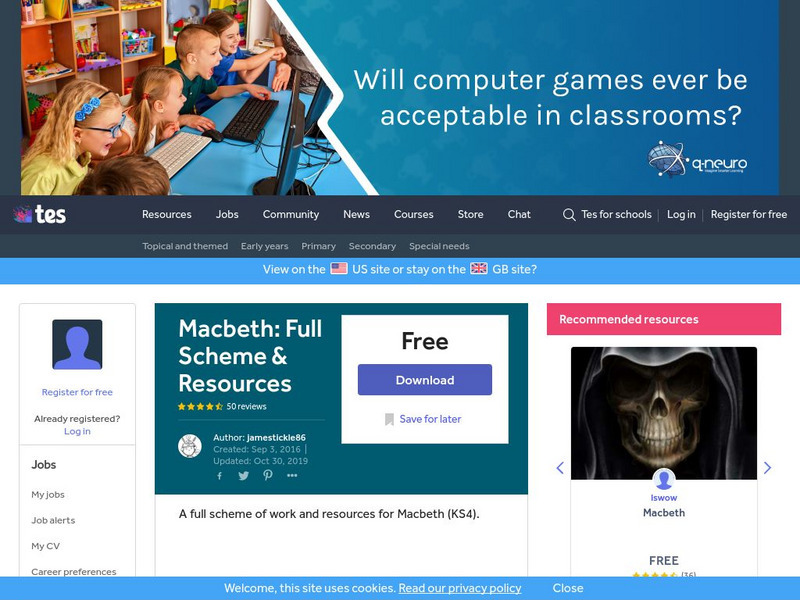Curated OER
Knock, Knock, or Whose Line is it Anyway?
Students compare two versions of Macbeth and participate in improvisational acting. In this improvisational lesson, students read and discuss the text before watching two different versions of the film. Students roleplay...
Curated OER
Looking at Life through the Creation of Personal Metaphors
Students focus on the creation of personal metaphors, which are first illustrated in pictures and caricatures and then extended to descriptive/analytical paragraphs. They teach the lesson to others using their own personal metaphors as...
Curated OER
Lesson 1: Theatre Arts
Students create and perform based on cuttings from various plays and literature to demonstrate the learning of the process of improvisation. Students connect improvisation with theatre and real life. Students participate in a class...
Curated OER
Othello's Predecessors: Moors in Renaissance Popular Literature
Students gather textual citations from Othello, discuss stereotypes that they hold, examine primary source materials, and write character profiles.
Curated OER
"O, I have lost my reputation" - Why Reputation Matters in Othello
Students examine Othello's references to and attitudes toward reputation.
Curated OER
The Concept of the Hero
Young scholars explore the symbolic implications for the concept of the hero with a focus on the Beowulf theme. In this hero concept lesson, students find specific examples of monsters from Beowulf to complete the chart. Young scholars...
Curated OER
The Renaissance was a Rebirth
In this Renaissance study guide worksheet, students read a brief overview pertaining to the time period in world history and then respond to 4 reflection questions.
Curated OER
The Power of Music
Learners analyze the music Shakespeare chose for his play The Tempest. They seek to research why he alluded to popular music and contemporary artists. Students make connections between their own musical knowledge/tastes/interests and the...
Curated OER
Scatterbrained Soliloquies
Pupils reconstruct a famous soliloquy from Romeo and Juliet which the teacher has cut apart and scattered. They piece the soliloquy back together making sense of the passage.
Other
Stratford Shakespeare Festival: Macbeth 2016 Study Guide [Pdf]
This Stratford Study Guide has a history of the Stratford Shakespeare Theatre, a biography of Shakespeare, a timeline of his playwriting, historical background about the play, a synopsis of the play, classroom activities and a bibliography.
TES Global
Tes: Macbeth by William Shakespeare: The Role of the Witches
[Free Registration/Login Required] This lesson plan focuses on the role of the witches in Shakespeare's Macbeth including background information about the fear of witches in Shakespeare's time, reading excerpts and answering questions to...
National Endowment for the Humanities
Neh: Edsit Ement: Macbeth Fear and the Motives of Evil
"Why does Macbeth, who knows that his actions are evil and will be punished, continue to choose evil?" Through this study of Macbeth's evil deeds, high school students will not only test their reading and research skills but also explore...
PBS
Pbs Learning Media: Supernatural Elements in Macbeth
In this self-paced lesson, students explore how Shakespeare uses supernatural elements in Macbeth. It begins with an exploration of beliefs about the supernatural and witchcraft in Shakespeare's time as presented in a segment from...
TES Global
Tes: Macbeth: Full Scheme & Resources
[Free Registration/Login Required] A complete unit on Shakespeare's Macbeth.
National Endowment for the Humanities
Neh: Edsit Ement: Fear and the "Dagger of the Mind"
This lesson plan accompanies a reading of Shakespeare's Macbeth and lets students explore Macbeth's "response to fear" through studying metaphor, imagery, and dramatic cues and by performing a scene.
TES Global
Tes: Macbeth: Introduction to Witchcraft Context Lesson
[Free Registration/Login Required] This slide show lesson focuses context of witchcraft in Shakespeare's Macbeth including learning about witchcraft in the 17th century, identifying a witch, the timeline of The Witch Acts, and watching...
Folger Shakespeare Library
It's Elementary! Stomping and Romping With Shakespeare
In this elementary school-age lesson, children will learn about rhythm and meter through the lines of William Shakespeare. Students will recite and "act out" the song lines from "A Winter's Song" found in Love's Labour's Lost and "A...
Varsity Tutors
Varsity Tutors: Web English Teacher: William Shakespeare: Macbeth
This site features links to lesson plans and other teaching resources for William Shakespeare's "Macbeth."
Louisiana Department of Education
Louisiana Doe: Louisiana Believes: English Language Arts, Grade 10: Macbeth
Students explore the ideas of ambition and failure. They learn that conflicts serve as the basis of a text's meaning and that identifying the internal and external conflicts of a story reveals the motivations of complex characters. They...
Organization for Community Networks
Ofcn: Macbeth
Have you ever read any of Shakespeare's work that you don't quite understand? This site features a lesson plan for "Macbeth" that will help your students understand and enjoy his work.
Alabama Learning Exchange
Alex: A Creative Twist to the Tragedy of Macbeth
A Creative Twist to The Tragedy of Macbeth is a project that gives students an opportunity to express their understanding of Macbeth through their artistic ability. The activity appeals to the learning style of all students by allowing...
Alabama Learning Exchange
Alex: Modern Day Macbeth
As students work in small groups to compose scripts and produce videos recreating a selected scene, they demonstrate an understanding of Macbeth and the elements of drama.
Alabama Learning Exchange
Alex: Using Digital Notebook to Visualize Thematic Links
Students will work in groups of two or three to produce two pages of a digital scrapbook covering a thematic element from Macbeth. The pages will then be assembled into a visual review of the play's themes and character motivations...









![Stratford Shakespeare Festival: Macbeth 2016 Study Guide [Pdf] Lesson Plan Stratford Shakespeare Festival: Macbeth 2016 Study Guide [Pdf] Lesson Plan](https://static.lp.lexp.cloud/images/attachment_defaults/resource/large/FPO-knovation.png)








